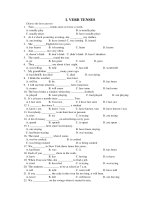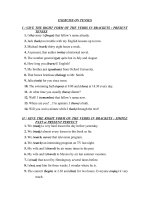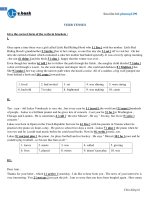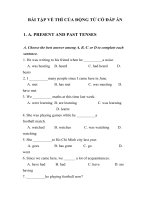bai tap cac thi cua dong tu
Bạn đang xem bản rút gọn của tài liệu. Xem và tải ngay bản đầy đủ của tài liệu tại đây (77.06 KB, 4 trang )
EXERCISE ON TENSES
I / GIVE THE RIGHT FORM OF THE VERBS IN BRACKETS : PRESENT
TENSES
1. I (be) sorry I (forget) that fellow’s name already.
2. Jack (look) no trouble with my English lessons up to now.
3. Michael (work) thirty eight hours a week.
4. At present, that author (write) a historical novel.
5. The weather general (get) quite hot in July and August.
6. How long you (learn) E English?
7. My brother just (graduate) from Oxford University.
8. That brown briefcase (belong) to Mr. Smith.
9. Julia (wait) for you since noon.
10. The swimming bath (open) at 9.00 and (close) at 18.30 every day.
11. At what time you usually (have) dinner?
12. Well! I (remember) that fellow’s name now.
13. Where are you? _ I’m upstairs. I (have) a bath.
14. Will you wait a minute while I (look) through the text?
II / GIVE THE RIGHT FORM OF THE VERBS IN BRACKETS : SIMPLE
PAST or PRESENT PERFECT
1. We (study) a very hard lesson the day before yesterday.
2. We (study) almost every lesson in this book so far.
3. We (watch, never) that television program.
4. We (watch) an interesting program on TV last night.
5. My wife and I (travel) by air many times in the past.
6. My wife and I (travel) to Mexico by air last summer vacation.
7. I (read) that novel by Hemingway several times before.
8. I (not, see) him for three weeks. I wonder where he is.
9. The concert (begin) at 2.30 and (last) for two hours. Everyone (enjoy) it very
much.
10. The play (just, begin). You’re a little late.
11. Mr. Count (work) as a cashier for 25 years. Then he (retire) and (go) to live
in the countryside.
12. We (miss) the bus. Now we have to walk.
13. I (not, see) him since last Monday.
14. I (never, read) such an interesting story in my life.
15. How many films you (see) this month?
16. His health (improve) since he (leave) India.
III / GIVE THE RIGHT FORM OF THE VERBS IN BRACKETS : SIMPLE
PAST or PAST CONTINUOUS
1. When I (arrive) at his house, he still (sleep).
2. As we (cross) the street, the policeman (shout) at us.
3. The lights (go) out while we (have) dinner.
4. The phone (ring) when I (have) a shower.
5. It (begin) to rain when I (walk) home.
6. We (see) an accident when we (wait) for the bus.
7. Just as I (leave) for home, a student (stop) me in the hall.
8. When the student (hear) the bell, they (get) up and (leave).
9. George (fall) off the ladder while he (paint) the ceiling.
10. Last night I (read) in bed when I (hear) a scream.
11. You (watch) TV when I (phone) you?
12. All the students (stop) talking and (stand) up when the principal (enter) the
class.
IV / GIVE THE RIGHT FORM OF THE VERBS IN BRACKETS : S. PAST,
PAST PERFECT (cont.) or PAST CONTINUOUS
1. They (go) home after they (finish) their work.
2. He (do) nothing before he (see) me.
3. He (thank) me for what I (do) for him.
4. I (be) sorry that I (hurt) him.
5. I (not, see) my friend for ages when I (catch) sight of him this morning.
6. You (wear) your new hat when I (meet) you yesterday.
7. The house (be) much smaller than he (think) at first.
8. Before you (mention) him, I (never, hear) of that author.
9. When I (go) to see them last night, they (play) cards. The (say) they (play)
cards since six o’clock.
10. The little girl (ask) what (happen) to her ice-cream.
11. They (ask) why we (come) so early.
12. While you (play) the piano, I (write) a letter.
13. They (sell) all the books when we (get) there.
14. He (sleep), so he (not, hear) what you said to him.
15. Tom was very tired because he (run) for an hour.
V / GIVE THE RIGHT FORM OF THE VERBS IN BRACKETS : S. FUTURE
, S. PRESENT, PRESENT PERFECT, FUTURE PERFECT or FUTURE
CONTINUOUS
1. We’ll go out when the rain (stop)
2. I (stay) here until I (get) the answer from him.
3. I’ll be ready before you (count) ten.
4. Miss. Helen (help) as soon as she (finish) her work.
5. He (believe) whatever you tell him.
6. If petrol pump attendants go on strike, we (not, have) any petrol.
7. I’m sure that I (recognize) him.
8. He’s cut my hair too short. _ Don’t worry; It (grow) again very quickly.
9. I (give) him your letter when I (see) him tomorrow.
10. When you (go) into the office, Mr. Young (sit) at the front desk.
11. Our teacher (explain) that lesson to us tomorrow morning.
12. Mr. and Mrs. White (live) in their new house by next spring.
13. They swear that they (not, come) home until they (see) everything.
14. I (finish) the book before my next birthday.









